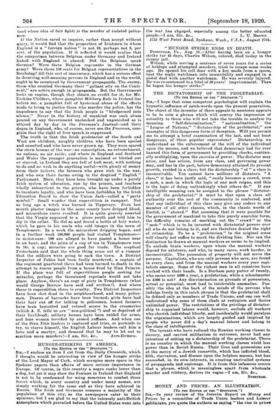THE DICTATORSHIP OF THE PROLETARIAT. [To THE EDITOR OF THE
" SPECTATOR."] SIR,—I hope that some competent psychologist will explain the hypnotic influence of catch-words upon the present generation. The object of the inventor of these appeals to nescience appears to be to coin a phrase which will convey the impression of actuality to those who will not take the trouble to analyse its meaning. " Self-determination," " nationalization," the " League of Nations," " dictatorship of the proletariat," are examples of this dangerous form of deception. Will you permit me to attempt a brief examination of the last, and not least dangerous, of these popular expressions? Dictatorship we understand as the enforcement of the will of the individual upon the masses, and we believed that democracy had for ever banned this farm of government by providing checks; continu- ally multiplying, upon the exercise of power. The dictator may, arise, and has arisen, from any class, and governing power may, and has in the past, before democracy attained its present growth, resided in a class; but the dictatorship " of " a class is inconceivable. You cannot have millions of dictators. " class," it has been justly said, "easily becomes a crowd, even a mob, a mob in which the logic of any mob reigns, and this is the logic of doing unthinkingly what others do." If any intelligible meaning can be assigned to the phrase "dictator- ship of the proletariat," it must be that upon a class all authority over the rest of the community is conferred, and that any individual of this class may give any orders to any member of all other classes, which, in the classic words of Euclid, is " absurd." But assuming that it were possible for the government of mankind to take this purely anarchic form, the difficulty remains of marking out the " crowd" or the " mob " which is to be invested with dictatorial powers over all who do not belong to it, and are therefore denied the right of citizenship. To be a "proletarian" in the original sense will clearly not suffice to mark the dividing line. Nor can the distinction be drawn at manual workers as seems to be implied. To exclude brain workers, upon whom the manual workers depend for existence, and who, in many cases, work harder, is inconceivable. The possession of property will not serve the purpose. Capitalists, who are only persons who save, are found in every class, and from the manual workers every year capi- talists emerge. Some of the richest men in all countries have worked with their hands. Is a Durham pony putter of twenty, who earns over S.600 a year, a proletarian, while a schoolmaster on £300 is not? Any discrimination on grounds of possessions, actual or potential, must lead to intolerable anomalies.' Pos- sibly the idea at the back of the minds of the persons who indulge freely in this catch phrase is that the proletariat shall be defined only as members of Trade Unions, and one can well understand why some of them chafe at restraints and desire unlimited power. The restrictions of the privilege of dictator- ship to organized labour would, however, exclude all workers who cherish individual liberty, and incidentally would paralyze the organizations, which are largely guided and inspired by people who never did a day's manual labour and belong to the class of intelligentsia.
The tyrants who have reduced the Russian working classes to slavery, and carried militarism to extremes, never had any intention of setting up a dictatorship of the proletariat. There is no country in which the manual working classes wield less power than in Soviet Russia. Their lives and possessions are at the mercy of a Jewish can:aril/a, which has inflicted blood, filth, starvation, and disease upon the helpless masses, but has succeeded, in its own interests, in creating unrivalled systems of propaganda and espionage. It is from this infamous source that a phrase, which is meaningless apart from wholesale murder and robbery, derives its vogue.—I am, Sir, &c., &DENHAM.






































 Previous page
Previous page